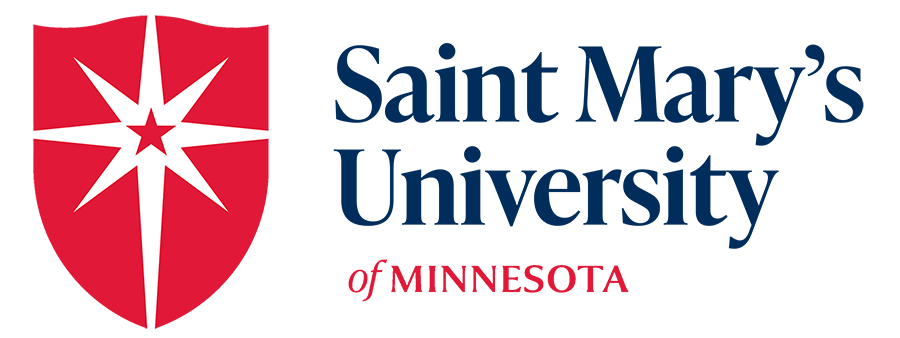News

reIMAGINE Learner Engagement
The Instructional Technology team has curated an opportunity that provides ideas and tools to enhance student learning. We invite you to see yourself reIMAGINE Learner Engagement. This resource includes exemplars in both content and structure gathered from across the University. reIMAGINE means to inspire instructors to continually update their courses-for the optimal student learning. Student learning is evolving, and presenting content needs to be evolving as well. Check out the short video below to hear what it means to reIMAGINE Learner Engagement!
(click here if the video does not load for you)
The reIMAGINE resource is specifically designed for instructors with various needs and skills (modules intended to meet each faculty where they are at: introductory, intermediate, and advanced). The modules page hosts the majority of the content and is the place to begin exploring. In each module, there is a page with a description of what type of skills are needed in order to implement ideas from the module. This will help lift some anxiety about applying new ideas to a course. The Instructional Technology team is ready to assist any instructor wanting to make changes to their content. The team will assist with planning, developing, and testing new content ideas. In addition to implementing your vision, the Instructional Technology team can help with brainstorming and offer insights into new content for your course. When you’re there be sure to check out:
- Asynchronous training – these are self-paced, interactive training sessions intended to help increase your proficiency in various areas of course design.
- Recommended Tools and Strategies – here is a curation of ideas utilizing best practices in education and the core suite of instructional tools at your disposal.
- Alternative Discussion Ideas – 12 innovative discussion ideas to help engage your learners at a whole new level.
- Exemplars from peers – A handful of modules from across the university highlighting innovative ways to engage learners at any stage in learning.
reIMAGINE is a host for training and resources outside of content creation. Extra blue links have been added to create a seamless guide. The Panopto videos of the Weekly Tech Tips from Saint Mary’s Today are stored in reIMAGINE. As a new tip is sent out, the video from the tip is added to the reIMAGINE. All of the videos are stored in one place making it easier to search out a past tip. A “Resource” blue link has been added to the navigation bar. Here is where the citation for the course content used in the module resides. There are buttons inside the resource page that link out to the CELT/ Canvas Training Recordings. The training from beginner Canvas to Deep Dive Canvas is readily available. The other button links out to the Canvas Resource Course. The resource course holds review materials on how to use canvas, create modules and pages, use the grade book, add a rubric, etc.
The Minneapolis and Winona campuses have physical spaces for reIMAGINING innovation as well. On the Minneapolis campus in LaSalle Hall 50, and in Winona, Saint Mary’s Hall 125. These spaces are used for many activities. For one, testing potential software either on your own or with an Instructional Technologist. Here, testing can be done to find the pros and cons, and how useful it can be for a course and/or program. Both campuses have recording spaces, as well as light board to take your content to the next level. Another purpose to the Innovation Rooms will be to meet with Instructional Technologists. These meetings can also be in place of a zoom meeting. The members of the team are each equipped to assist instructors with their courses.
Start your journey to reIMAGINE Learner Engagement!
Visit reIMAGINE in Canvas Schedule a 1:1 consultation with Instructional Technology Questions? Email Instructional Technology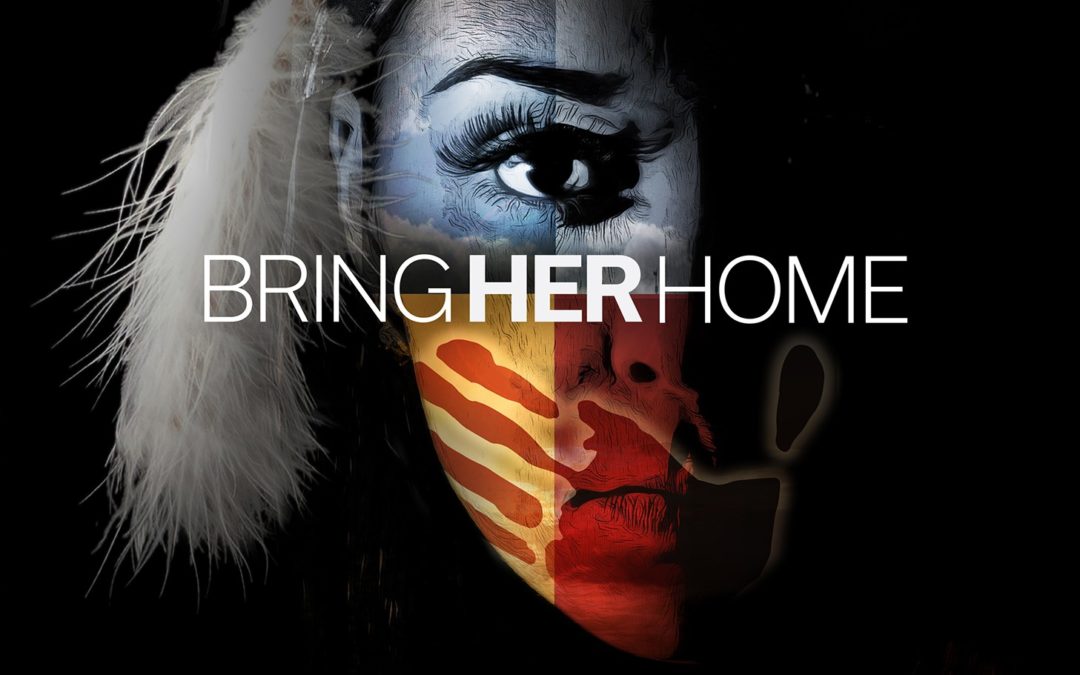
Bring Her Home – Community Screening
The Office of Inclusion and Human Dignity and the Center for Excellence in Learning and Teaching invite you to join your colleagues and the local community in a screening of the newest documentary film by Director Leya Hale, Bring Her Home. This documentary film follows three Indigenous women — an artist, an activist and a politician — as they work to vindicate and honor their relatives who are victims in the growing epidemic of Missing and Murdered Indigenous Women. Following the screening will be a discussion with Director/Producer Leya Hale and other film participants. The documentary trailer is embedded below.
Please register for the screening by using the links below. There will be a dedicated screening on both campuses.These events are open to all Saint Mary’s Students, Faculty and Staff.
Click here to register for the Twin Cities Screening
Click here to register for the Winona Screening
Full Press Release:
“Bring Her Home” tells the story of three Indigenous women fighting to vindicate and honor their missing and murdered relatives. An activist, an artist and a politician each strive to find healing and hope for themselves and for their Native community. Co-produced with Vision Maker Media, an organization dedicated to empowering and engaging Native people to share stories, “Bring Her Home” will be broadcasted locally on TPT and nationally on PBS stations, and the film will be available for streaming on tpt.org starting March 21, 2022.
“Bring Her Home” explores a little-discussed human rights issue by following the stories of three Native women as they seek justice and honor for their murdered and missing relatives. Artist Angela Two Stars, activist Mysti Babineau and Representative Ruth Buffalo have all experienced and coped with the enduring trauma of colonization in their Indigenous communities. Within the framework of marching at the Missing and Murdered Indigenous Women’s Rally and March, an annual community event honoring missing Native women, the film tells the stories of how these women have brought attention to the crisis while also providing encouragement to their communities.
“Native women make up less than 1% of the U.S. population, yet face murder rates that are more than 10 times the national average,” said Director and Producer Leya Hale of the Sisseton Wahpeton Dakota and Diné Nations. “I’ve made it my obligation to not only highlight the challenges my people face, but to offer stories of resilience, healing, and hope to empower Indigenous communities near and far. It is my hope that this film will drive public awareness that will serve as a catalyst for conversation, cultural reclamation and ultimately, systemic change.”
Read more on the documentary film and the women who lived it by going to https://www.tpt.org/bring-her-home/

SGPP Spring Term 1 COVID-19 Semester Updates
Data is indicating that we will see a surge in COVID-19 cases in January 2022. Because of this projection coinciding with the start of the next SGPP term on January 3, 2022, the first four weeks of that term will be held online. This is also defined as “Emergency Remote Learning,” as previously outlined here. So, from January 3, 2022, through January 30, 2022, all courses on our Twin Cities and Rochester campuses will be held virtually. In certain cases, exceptions may be made for classes that cannot be offered online. These will be handled on a case-by-case basis with approval from Academic Affairs.
The CELT website has a variety of resources prepped and ready to support you during this shift. For training sessions on Canvas, Panopto, Zoom, and more, please check out the Recorded Trainings linked here. In addition, resources on the CardinalFlex model are designed to guide your shift to teaching fully online.
Additionally, the Remote Teaching Guidelines have been updated to ensure best practices, tools, and support systems are easily available for you. Also, the Remote Learning Guidelines pages have also been updated and are recommended to share with your students.
If at any point you would like to have a dedicated session to review your course content, practice using a tool, or discuss how best to engage your students when fully online, please click here to schedule a consultation with a member of Instructional Technology. They will be available the week of December 27th through December 30th to ensure a smooth start to your semester. They will be able to guide you through using various tools (Canvas, Zoom, Panopto, etc..) and provide support in shifting course activities to best suit the online environment.
If you have any questions please contact:
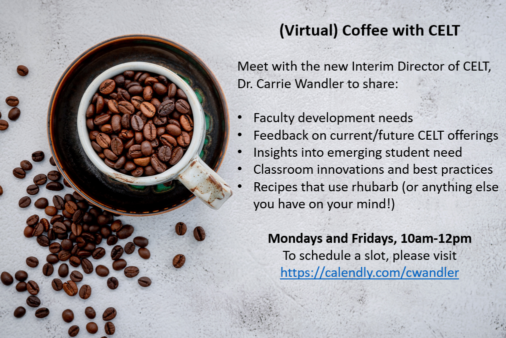
(Virtual) Coffee with CELT
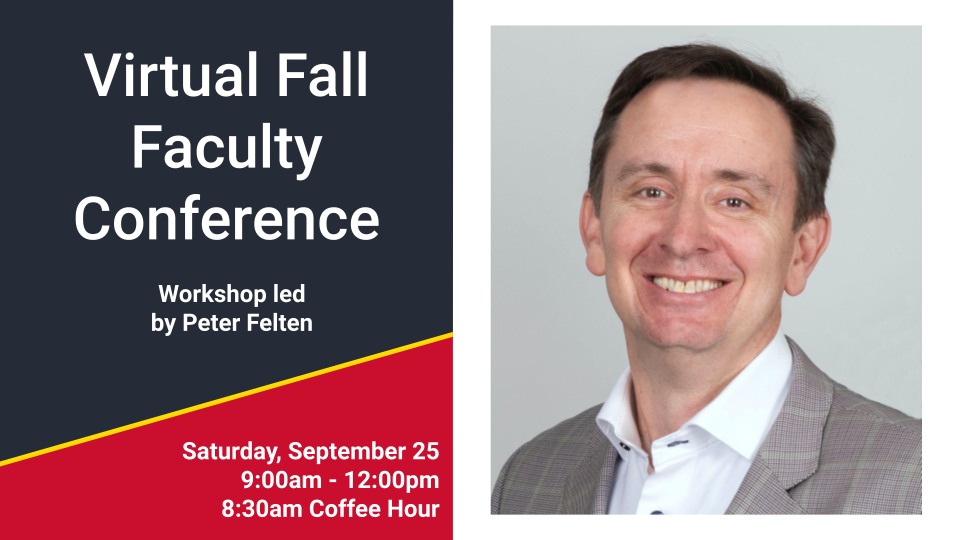
Virtual Fall Faculty Conference 2021
This year, just as last year, the Fall Faculty Conference workshop will be hosted virtually due to COVID protocol. Faculty from both the School of Graduate and Professional Programs (SGPP) and The College are invited to participate.
| Saturday, September 25, 2021 | ||
| 8:30am – 9:00am | “Coffee Hour” hosted by Across Campus Connections Like the ACC in car wiring, our purpose is purely to create a space for you to make connections and get to know and enjoy your colleagues so that you can “keep your charge” and conserve your “battery power” for the work you do at SMU. Come as you are, leave with new friends. Grab your cup of coffee and jump on the Zoom link early! This is an opportunity to gather and start our day on an uplifting note. |
|
| 9:00am – 12:00pm | Fall Faculty Conference led by Dr. Peter Felten. The 3-hour workshop will include a break and the presentation of the Brother Julius Winkler Award | |
Description
Led by Dr. Peter Felten, executive director of the Center for Engaged Learning, assistant provost for teaching and learning, and professor of history at Elon University, this interactive workshop will explore how to create relationship-rich environments that enhance learning, motivation, and belonging. The first part of the workshop will focus on practical, research-informed approaches to cultivate educationally powerful human interactions in classes — whether face-to-face, online, or blended. The second part of the workshop will focus on the importance and impact of significant conversations among instructors on their teaching. Through these conversations with peers, instructors are able to promote and transform their teaching and ultimately enrich student learning.
The workshop draws from Dr. Felten’s research and his most recent book Relationship-Rich Education: How Human Connections Drive Success in College (Johns Hopkins University Press, 2020) by Peter Felten and Leo Lambert.
Learning Objectives
- Discover the four principles of relationship-rich educational experiences
- Reflect upon one’s current approaches to creating a class culture
- Identify how to cultivate classroom environments and teaching communities that enable meaningful relationships
- Consider how to create conditions that enhance teaching while also fostering a culture that enables transformational and meaningful change
Post-Conference Opportunity to Engage
Following the Fall Faculty Conference, CELT will host a book club dedicated to the book. Consult the CELT events calendar to review Book Club dates and times and to register – coming soon!

Course Processes in Canvas
In the move to Canvas, Saint Mary’s now has the ability to automate certain features that did not exist in other systems. One of these features is how courses are created and how content can be added to courses. In this process, we are able to automatically create courses in Canvas that not only have enrollments in them but also content and a similar course structure. What assists in this process are the usage of main course shells. Using main course shells helps to organize content within the LMS, and streamline the course automation process from term to term. Please read through the rest of this to gain a further understanding of this process and what to expect. This document is also attached to this email in an accessible pdf for convenience.
What is a course with a MAIN_ prefix at Saint Mary’s?
“Mains” are the repository of course content. More specifically they are the curated content for a specific course that contains course materials, assignments, and syllabi. One can think of a main course shell as the official repository for a specific course. In many cases currently, a main course in Canvas contains the content that was migrated from Blackboard or Engage. As a course is continually taught the content from the main will be applied to the term version of the course (i.e., FA21). This allows for a course to use similar content term to term.
-
Main courses are identified with the word main in the title (MAIN_EDUC111).
Who updates main courses? Why use main courses?
Depending on the program/department mains can be updated by individual faculty or can be updated by a team of faculty. For programs/departments that may offer multiple sections of a course each term, mains provide a way for each section to have the consistent content to ensure the integrity of the course is maintained. At the end of the term instructors, programs, and departments can request that the content from the term course is copied into the main course to ensure the main course always has the most current content.
-
Additionally, by updating your courses consistently between terms you ensure that your students receive the best overall experience. The Canvas Minimum Usage document outlines a phased approach as the university moves into Canvas.
-
As a clarifying note, students will never be enrolled in main course shells so that instructors have a dedicated place to build and curate content.
What is a term prefixed course at Saint Mary’s?
A term prefixed course is the ‘live’ course running in a specific term. Term prefixed courses are identified with a specific term prefix in the name of the course (i.e., FA21COLLGE_EDUC111, or FA21SGPP_EDUC111). A term course is linked to the Student Information System (SIS–in our case, CAMS) for enrollments and contains content from the corresponding main course.
When do I work in a main course versus a term course?
Instructors, program directors, chairs, and program staff are encouraged to continually curate content in the main course shells up until four (4) weeks prior to the start of a term. At four weeks prior to the term prefixed courses are created that contain enrollments and the content from the main course shells. At that point, any and all further updates should be made in the term course.
-
As a term’s ending approaches, instructors/programs/
departments can request that the content from the term prefixed course is copied into the main course shell to ensure the main course shell always has the most current content.
Preparing for Fall 2021 and Pre-Term Actions
At this point in our migration process many courses were migrated from Blackboard/Engage to Canvas. These are in Canvas as main course shells (as described above) and are ready for continual enhancements. For those courses that do not have a main course shell they will be created for you and made available in early July. These newly established main course shells will not have content from Blackboard/Engage but will have the standard Saint Mary’s course template. Based on current fall teaching assignments instructors will be added to the mains. Please work in these main courses until August 2nd. On that date, the content from the main course will be added to the FA21 term courses.
-
If you need content from Blackboard or Engage that was not already migrated please request that by contacting the Help Desk.
Ongoing Pre-Term Actions
-
Eight (8) weeks prior (or more) to the start of a term:
-
Faculty should update main course shells to include the most current content. This may involve collaborations with learning design, instructional technology to help enhance the engagement within a course.
-
If the entire content from a term course is needed, said content can be copied into a main course shell by putting a request into the Help Desk
-
-
-
Four (4) weeks prior to the start of a term:
-
Term prefixed courses (i.e., FA21College_EDUC111) are created, and faculty and student enrollments are added (both of these are based upon what is listed in CAMS). Content from identified main course shells are automatically added to the term courses.
-
At this point faculty should halt making updates to main course shells and make any further updates to the term prefixed course.
-
-
-
Two (2) weeks prior to the start of a term:
-
Faculty should publish their term prefixed courses so that enrolled students can view syllabi and look at course resources. Please note: Students have a ‘read-only’ access to the courses at this time.
-
Course publishing is part of the Canvas Minimum Usage document and is set to be at two weeks by Phase Three of the rollout of Canvas.
-
-
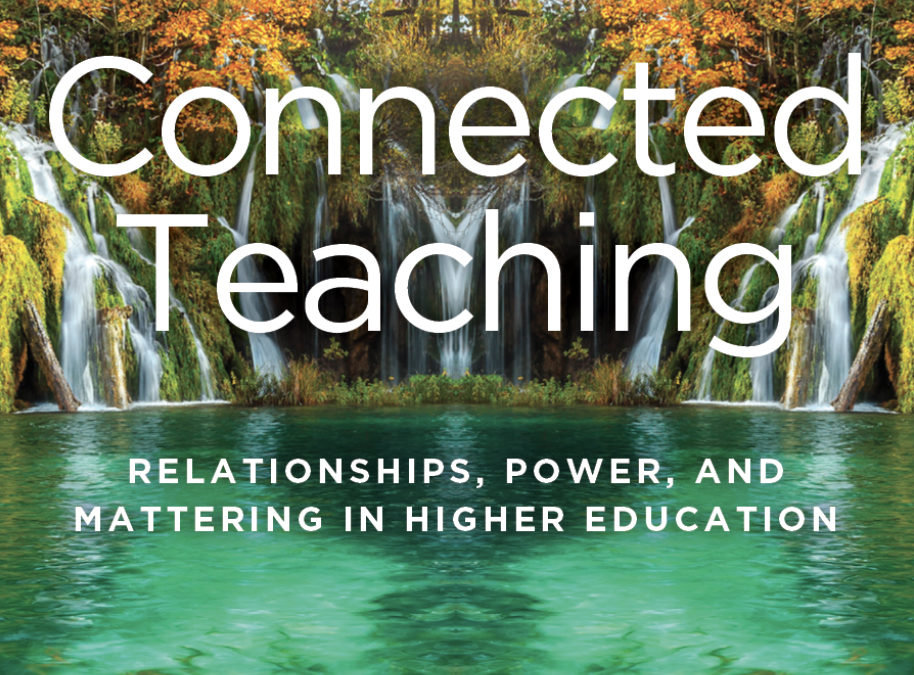
Summer Book Club on Connected Teaching
CELT is hosting a summer teaching book club on Harriet Schwartz’s book Connected Teaching, starting at 12pm on Wednesday, June 23rd and meeting every two weeks through the rest of the summer. We will meet on Zoom.
In this (virtual) book club, we will meet to discuss Dr. Harriet Schwartz’s book Connected Teaching. Echoing the Lasallian tradition, this book explores teaching as a relational practice – a practice wherein connection and disconnection with students, power, identity, and emotion shape the teaching and learning endeavor. The author describes moments of energetic deep learning and what makes these powerful moments happen. She calls on readers to be open to and seek relationship, understand their own socio-cultural identity (and how this shapes internal experience and the ways in which they are met in the world), and vigilantly explore and recognize emotion in the teaching endeavor.
The book club sessions will be co-facilitated by Dr. Tracy Lysne and Dr. Adam Potthast. We’d love for you to join us for the conversation about this book that explores the connection between teaching and relationships which is central to Lasallian pedagogy both online and face-to-face. A few of the interesting topics will be:
- Connected teaching when there isn’t enough time
- Assessment as a relational practice
- Setting appropriate boundaries with learners
- Power and relationships in the classroom
In the past, we’d had to limit participation in the summer book club due to the cost of providing a book to everyone. But this year the library has a license for as many electronic copies as we need, so anyone who wants to can participate!
Here is a link to the book, and see the dates below. If you can come, please RVSP here, where you can also find the first Zoom meeting link.
| Book Club Topic | Date |
| Introduction to Relational Cultural Theory Chapters 1 and 2 |
June 23, 12pm-1pm (Zoom) |
| Boundaries and Teaching Relationships
Chapter 3 Dealing with Disruption and Resistance in the Learning Space |
July 7, 12pm-1pm (Zoom) |
| Relationships and Assessment Chapter 4 |
July 21, 12pm-1pm (Zoom) |
| Power and Position (Exploring Educator Identity) Chapter 6Emotion and Teaching Chapter 7 |
August 4, 12pm-1pm (Zoom) |
| Disappointment and Failure (When Teaching Breaks Your Heart) Chapter 8Intellectual Mattering and Conclusion Chapter 9 |
August 18, 12pm-1pm (Zoom) |
